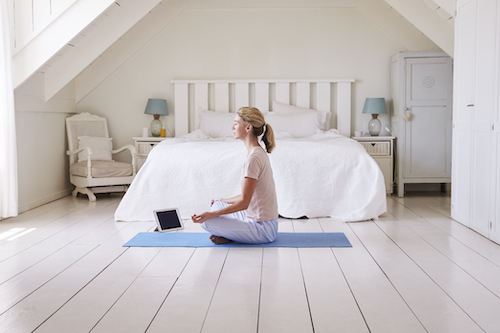
April is stress awareness month but with the country in lockdown due to the threat of coronavirus, anxiety is running high.
Restrictions on movements and fears for the future are expected to trigger a mental health crisis as people try to do their bit to slow the spread of the virus. But how can you manage your stress levels over the next few weeks without putting your own health or anyone else’s at risk?
Exercise releases endorphins which help to naturally lower your stress levels. It is still possible to leave the house once a day for exercise if you avoid crowded areas and stay at least two metres away from other people. However, if you have an underlying health problem or feel nervous about leaving your home, there are plenty of ways you can get your feel-good fix by exercising at home. Check out online exercise routines – there are plenty to choose from on YouTube – or this may even be a good time to dig out any old fitness DVDs which might be lurking in your cupboards. Consider investing in some home gym equipment like an exercise bike or running machine so you can get the benefits of going for a cycle or jog without having to go past your front door. They may take up a lot of space but you can always put them into self storage when the crisis is over. Andrew Porter Limited offer a highly affordable pay-per-item service which is a very cost-effective way of storing bulky objects when they’re not in use.
You may not be able to meet up with friends and family face-to-face but its important to stay socially connected to people for your own mental wellbeing. Take time to talk to your loved ones on the phone, make video calls or send each other messages. Having a conversation with another human being will help you feel less lonely and isolated. Apps like Zoom allow you to virtually meet up with a group of people so you can still see and hear each other even if you are all sitting in different homes.
When you’re worried about what is going on in the world, it can be easy to become fixated on checking the news. But obsessively checking social media and news sites for updates can fuel your anxiety and make you feel worse. Reading the news and staying informed is important but try to limit yourself to checking the main headlines once or twice a day. Try to be selective with which articles you read and go for ones which appear to be helpful and proactive rather than allowing yourself to be distracted by sensationalist clickbait headlines. And limit yourself to reading pieces published by established media outlets rather than memes or social media posts which may be inaccurate and based on misinformation.
While it is nice to have a pyjama day where you do nothing every once in a while, having too many days with no structure can be detrimental to your mental health. Maintain a sense of normality by getting up, washed and dressed in the morning and sticking to the usual times for mealtimes and bedtime. Set yourself tasks so you feel a sense of achievement as you tick them off. Even if you are able to work from home, you are likely to have more time on your hands so why not have a go at something new? Developing a new interest will help lower your stress levels and give you something positive to focus on.
Being stuck in the house is the perfect time to finally get round to clearing out your cupboards and making your home a clutter-free zone. Messy, cluttered houses add to feelings of stress so reducing the amount of stuff in your property will help you clear your mind and create a peaceful haven to relax in. Don’t attempt to declutter your entire home in one go – start small and tackle one area at a time. Sort everything into categories – the things you want to keep in your home, items you can’t bear to part with but you’re not sure where they should go and things you no longer need or want. Anything you decide to get rid of can either be thrown away or donated or sold once the lockdown is over. Put any items you’re not ready to say goodbye to into self-storage if they don’t have a natural place in your home. That way, you can access them again when you need to and if you really don’t miss them once they have been in storage for a few months, you might feel better about rehoming them for good.